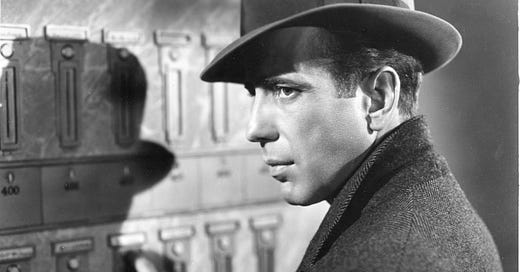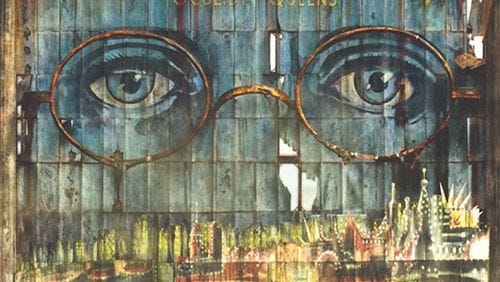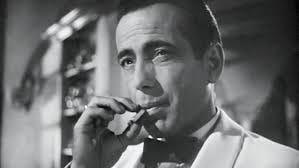A man is sitting in the middle of the manicured green lawn framed by tall square-top hedges thick enough to keep the world out. He’s smoking a cigar and seems to be contemplating the angle of the hedge that contrasts artfully with the blue sky as it transitions to the deeper blues and violet hues that accompany the Los Angeles sunset. He eases back in the wood and canvas Outer branded lawn chair. Raylan Teak, he was told, with a hand-worn, sustainable heirloom fabric in a throwback 1960s-era burnt orange stripe — information more keenly interesting to the giver than the receiver, for which he nods solemnly, “Ah, hand-worn, for superior posterior comfort” — a slogan fit for a Young and Rubicam ad.
He contemplates the cigar in his hand and turns his gaze upward to the softly emerging stars. He rests his bare hand on the chair’s narrow arm beside his casually bent legs, erasing the faint crease on his light trousers, into which a cream cotton Polo shirt was purposefully tucked — a little higher than was fashionable, he’d been told, but if a higher hip was good enough for Clark Gable…at least it distorted his slightly diminutive stature. Everything old can be new again.
The scene unfolds with a solitary figure, a loner, positioned in the vastness of the sprawling lawn. It is timeless and effortless in that it could be the image on a Hollywood postcard from 1924, 1944, or 2024. He stands apart from the glamour and pomp, the people talking at each other solely for the purpose of being seen by someone else. In this moment, the hero is revealed by this apartness the way of a man who only exists as a bridge between the present and the past.
The hero is this man who can rest his thoughts beyond the blaring sirens, impervious to the racket, the mind adrift. “The Last Dance,” with its jazzy 1958 charm, smooths the edges of the twilight, as Sammy Cahn and Jimmy Van Heusen’s effervescent notes lift to the heavens.
So, he’s shoved off to the middle of the lawn, alone. But deep down we know he’s placed there because his very presence evokes and makes us plainly aware — and deeply ashamed of our pettiness and the smallness of our superficial glories. He is a man who doesn’t stand for something; he believes in something at a time when people believe in less and less.
He is the last hopeful cynic, the last believer in stories, the last American Romantic. Hard-boiled down to his guts that give way to a tender optimism. A man who makes you believe in the reality of the human condition and the possibility of the human imagination. He is a man not made for the time but what this time needs.
From the 1920s through the mid-20th century, America was the last era of the romantic American hero. He is John Wayne’s Ethan Edwards in The Searchers and Rick Blaine in Casablanca. He is found in Hemingway’s stories, Faulkner’s epics and F. Scott Fitzgerald’s American masterpiece. He was John Ford’s hardened cowboy and Frank Capra sent him to Washington. He was expendable, hardened, cavalier, loyal, gallant, and, at his core, a dreamer. We know this man and need this man but refuse him.
He is set apart because of this romantic ideal — not a sentimental romance — but a romantic worldview that is edged with tragedy — tragic because our hero takes a courageous leap of faith that others would never consider because it’s easier and less risky to hide within the confines of one’s grievances and the safety of the tribe, and he’s ostracized, misunderstood, or used because of it.
Yet this man — this type of man — is outdated, we’re told. The present time has a pressure deeply anathema to the steady coolness in our hero’s eyes. He contains a sense of himself as being an outsider in a culture where everyone is scrambling to be on the inside, which ultimately marks his defiance — he could be called aloof if not for his utter lack of pretentiousness. There’s a dreadful appeal when he shows up: We know trouble is afoot, but with him, it won’t last long — or end pretty. In the September 1, 1964 issue of Esquire magazine, the late film director Peter Bogdanovich wrote an endearing tribute to Humphrey Bogart seven years after his death of esophageal cancer at age 57. It is a portrait of a man who became indistinguishable from his on-screen character. Bogdanovich writes of Bogart,
He was a man who tried very hard to be Bad because he knew it was easier to get along in the world that way. He always failed because of an innate goodness which surely nauseated him. Almost always he went from belligerent neutrality to reluctant commitment. From: “I stick my neck out for nobody.” To: “I’m no good at being noble, but it doesn’t take much to see that the problems of three little people don’t amount to a hill o’ beans in this crazy world.” At the start, if the question was, “What are your sympathies?”, the answer was invariably, “Minding my own business.” But by the end, if asked why he was helping, risking his life, he might say, “Maybe ’cause I like you. Maybe ’cause I don’t like them.” Of course it was always “maybe” because he wasn’t going to be that much of a sap, wasn’t making any speeches, wasn’t going to be a Good guy. Probably he rationalized it: “I’m just doing my job.” But we felt good inside. We knew better.
In Bogart, we saw a man whose feet were firmly planted in principles that were hard learned and harder fought for. He was apart from the surface-level glam and too bright lights of the industry around him. “A hot dog at the ballpark is better than a steak at the Ritz,” is just about anyone needs to know if asked about his loyalties. Rather than the bitter tribalism of today, he was an American first before it became a political bumper sticker — not out of any economic or foreign policy, but because he understood the blood and guts it took to nurture the national spirit and the wilds of our beginning.
The last American hero keeps this romantic worldview, often resulting in his being the lone figure leaning back in his chair, gazing into the vast unknown, despite everyone around him insisting his dreams are too big for this world and the target of his ambition should be to settle into anger and lies, politics, or fear. The hero lets go of this notion. Not only that but he is ready to save us from it just by existing in his realm, defiant.
You can be part of the world and not drown yourself in it, or as comedy writer and producer Rob Long explained in a recent Reason interview,
If you ever taught kids swimming in the old days, to get them used to the pool, they would throw in something heavy. And they would dive in and they would grab it and they would come back up and they bring the heavy thing up. And some kids drowned because they held on to this thing that was heavy and took them to the bottom of the pool. And they just forgot to let go. And it sounds horrible and completely bananas, but it also sounds really human.
And that's the thing you want to think about. What am I holding onto that I could just let go of, and then I could rise to the top?
We’ve forsaken the small things — perceived as dowdy and old-fashioned instead of timeless. We convinced ourselves that the Big War was coming, and we needed Big Personalities and brash, ruthless guile with an army of angry cynics urging us along. So we grow angrier and more petty and demand the same from our leaders — leaders who are not heroes. Leaders who think the romantic ideal of America is weak and outdated. The hero wants us to believe in our potential more than we believe in him.
F. Scott Fitzgerald writes in The Great Gatsby, one of the great novels embodying the American romantic ideal, our hero:
He smiled understandingly — much more than understandingly. It was one of those rare smiles with a quality of eternal reassurance in it, that you may come across four or five times in life. It faced — or seemed to face — the whole eternal world for an instant, and then concentrated on you with an irresistible prejudice in your favor. It understood you just as far as you wanted to be understood, believed in you as you would like to believe in yourself, and assured you that it had precisely the impression of you that, at your best, you hoped to convey.
After Humphrey Bogart died in January 1957, his friend Alistair Cooke wrote his epitaph in the May issue of The Atlantic that year. He ended it with a description of a man whose character and spirit were as defiant and immovable as he held steadfast to a certain American romanticism:
In sum, a vastly more intelligent man than most practitioners of his trade; a touchy man who found the world more corrupt than he had hoped; a man with a tough shell hiding a fine core. He invented the Bogart character and imposed it on a world impatient of men more obviously good. And it fitted his deceptive purpose like a glove. By showily neglecting the outward forms of grace, he kept inferior men at a distance. For he lived in a town crowded by malign flatterers, hypocrites and poseurs, fake ascetics, studio panders, the pimps of the press. From all of them he was determined to keep his secret: the rather shameful secret, in the realistic world we inhabit, of being a gallant man and an idealist.
Bogdanovich included this recollection in his Esquire essay:
“He wasn’t an extremist in anything,” said Miss Bacall, “except telling the truth. You had to admire Bogie. He always said what he thought. ‘Goddamnit,’ he used to say, ‘if you don’t want to hear the truth, don’t ask me.’”
That is the hero. To see the dream in another’s eyes and see that it holds the same expression as a child looks at a sea of stars — an extension of wonder and awestruck and becoming aware of the smallness of oneself, not diminished as to disappear, but as part of a vast mystery in which you’ve been chosen to live. Tell the truth. Walk the line. Hold onto the idealism that underlies America’s virtue because it is worth holding on to. Everything else, you can choose to let go.
Below are the original lyrics to “As Time Goes By,” the song highlighted in Bogart’s 1942 film Casablanca. The song was originally written by Herman Hupfeld for the 1931 Broadway musical Everybody's Welcome. I thought it important to include them.
Thank you for making it this far and for your patience through my writing drought. I appreciate the kind words and encouragement from a number of readers and fellow writers. Please don’t hesitate to offer your feedback and comments. They are always welcome. —Jenna
“As Time Goes By”
This day and age we're living in
Gives cause for apprehension
With speed and new invention
And things like fourth dimension.
Yet we get a trifle weary
With Mr. Einstein's theory.
So we must get down to earth at times
Relax relieve the tension
And no matter what the progress
Or what may yet be proved
The simple facts of life are such
They cannot be removed.]
You must remember this
A kiss is just a kiss, a sigh is just a sigh.
The fundamental things apply
As time goes by.
And when two lovers woo
They still say, "I love you."
On that you can rely
No matter what the future brings
As time goes by.
Moonlight and love songs
Never out of date.
Hearts full of passion
Jealousy and hate.
Woman needs man
And man must have his mate
That no one can deny.
It's still the same old story
A fight for love and glory
A case of do or die.
The world will always welcome lovers
As time goes by.
Oh yes, the world will always welcome lovers
As time goes by.
© 1931 Warner Bros. Music Corporation, ASCAP







Jenna,
If this essay is the result of your self-declared dry spell — let it rain, let it rain!
It is possible, as one of your more life-experienced readers, who has seen a number of Bogart movies, you had my interest at the words “a man who doesn’t stand for something, he ‘believes’ in something.” I wanted to continue reading; nonetheless, I paced myself not miss a descriptive word. Your powerful writing & way with words has the ability to transform your readers emotionally. It did me. You unequivocally have the ability ‘to paint an imaginative picture.’ You have a gift. “That no one can deny.”
Looking forward to what’s next… Thank you very much.
Wow... informative and entertaining. Have you ever considered writing a novel?